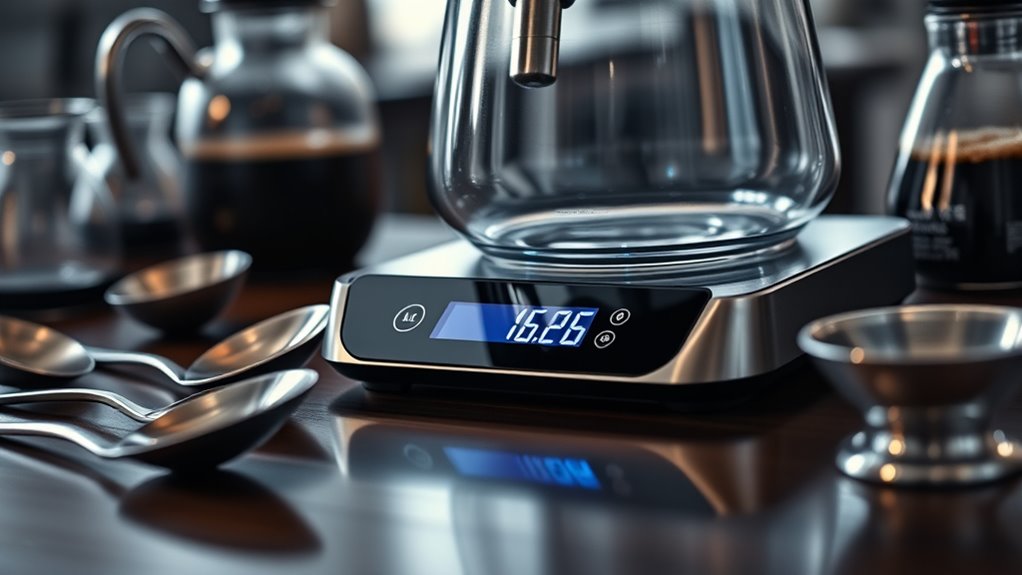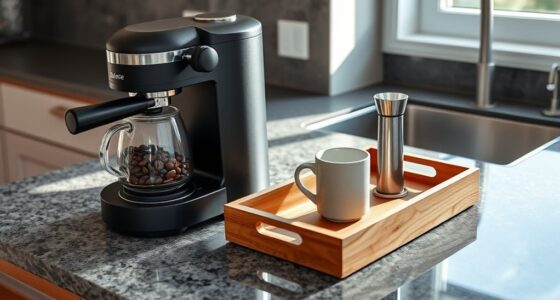Integrated scales in brewer bases offer plenty of convenience, allowing you to measure ingredients directly during brewing. However, their accuracy depends on the quality of the build, calibration, and environmental conditions like temperature and vibrations. While they work well for general measurements, they may not be perfectly precise for smaller amounts. To get the most reliable results, it’s important to understand how these scales function and how to maintain them properly. Keep going to discover tips for optimizing your brewing accuracy.
Key Takeaways
- Built-in scales offer convenient measurements but may lack high precision for small ingredient quantities.
- Calibration drift from environmental factors can affect their long-term accuracy.
- Proper placement on stable, vibration-free surfaces is essential for reliable readings.
- Regular calibration and environmental monitoring help maintain measurement consistency.
- For critical measurements, dedicated high-precision scales may be more accurate than integrated ones.
How Do Integrated Scales Work in Brewer Bases?
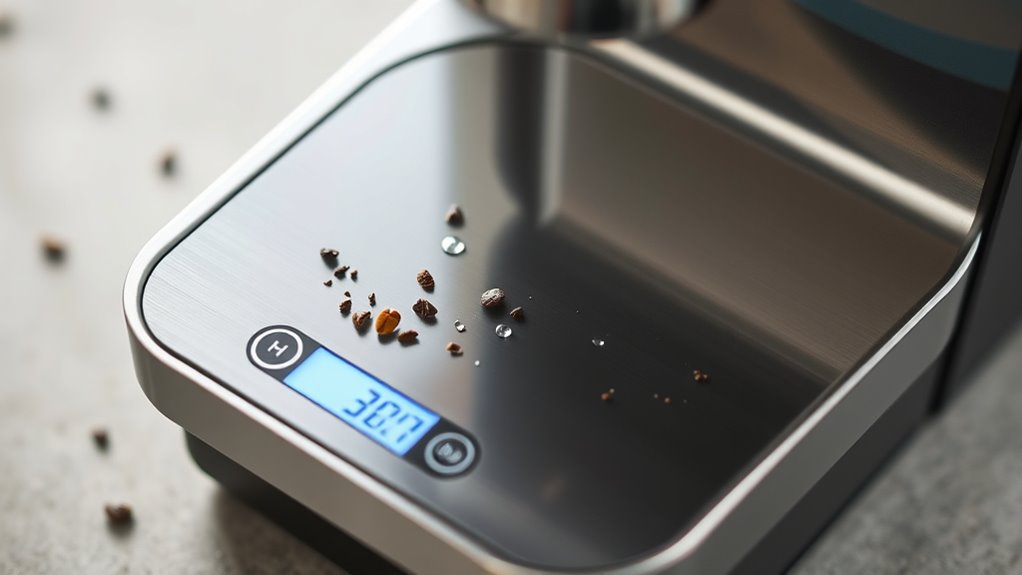
Integrated scales in brewer bases work by directly measuring the weight of ingredients as you add them. This process relies on sensitive sensors that detect small changes in weight, providing real-time feedback. To maintain accuracy, the scales depend on temperature stability within the machine, ensuring that fluctuations don’t affect readings. A stable temperature prevents sensor drift, so your measurements stay precise. Additionally, the power supply must be consistent; fluctuations can cause inaccurate weight readings or calibration issues. Most brewer bases include a built-in power regulation system to ensure steady operation. When these elements work together—temperature stability and a reliable power supply—the integrated scales deliver accurate, consistent measurements, making your brewing process more precise and reliable from start to finish. Proper calibration and regular maintenance also help sustain measurement accuracy over time.
Comparing Built-In Scales to Dedicated Measuring Tools
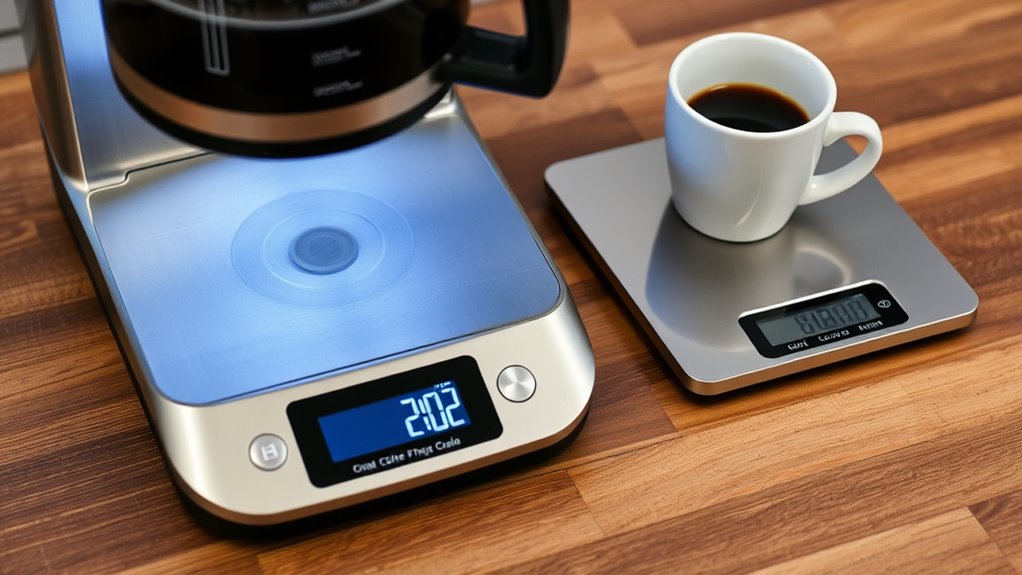
While built-in scales in brewer bases offer the convenience of measuring ingredients directly during brewing, dedicated measuring tools often provide greater accuracy and flexibility. Built-in scales tend to prioritize user convenience, allowing you to skip transferring ingredients, but their scale sensitivity may be limited. Dedicated tools, like precision scales and measuring cups, deliver finer measurements, ensuring consistent results. Additionally, understanding scale precision can help users select the most suitable measuring method for their needs.
Factors That Influence Scale Accuracy in Brewer Bases
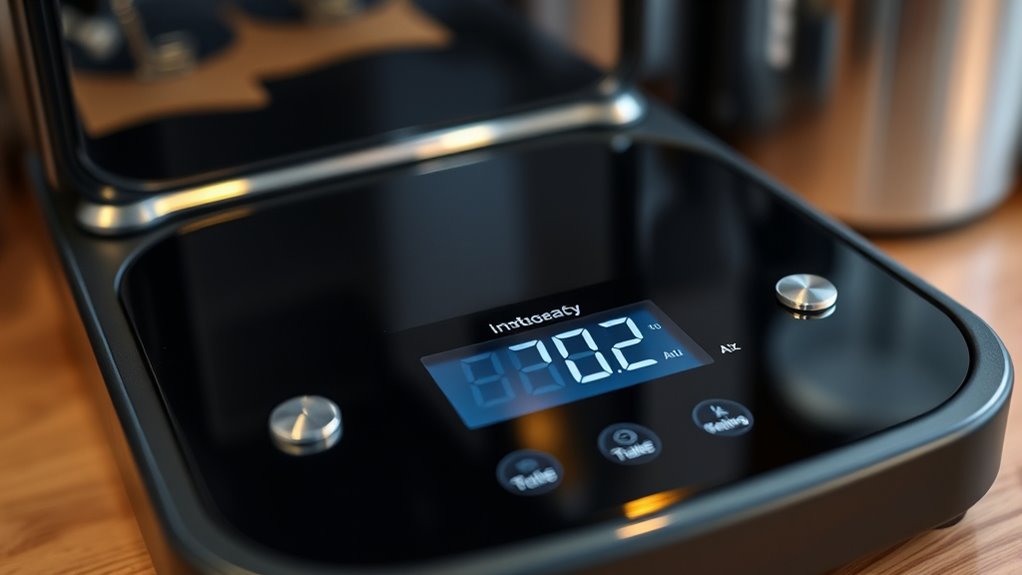
Several factors can affect the accuracy of scales in brewer bases, making it important to understand their impact. Scale placement is critical; if the scale isn’t level or properly positioned, measurements can be off. Verify your brewer base is on a flat, stable surface to avoid uneven weight distribution. Environmental factors also play a significant role—temperature fluctuations, humidity, and air currents can influence readings. For example, drafts from open windows or AC vents may cause inconsistent measurements. Vibrations from nearby equipment or foot traffic can also affect scale accuracy. To achieve reliable results, always place your brewer base on a stable, level surface and minimize environmental disturbances. Additionally, regular calibration of your scale helps maintain measurement accuracy over time, ensuring consistent and precise results. Being mindful of these factors helps ensure your integrated scale provides precise and consistent measurements.
Common Calibration and Maintenance Issues
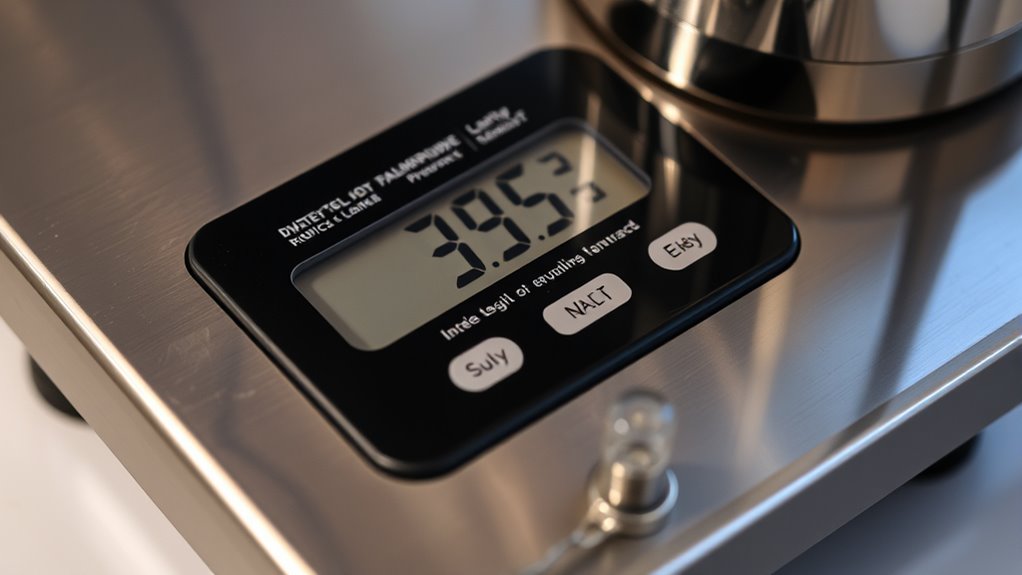
Calibration challenges can lead to inaccurate measurements if not addressed promptly. Regular maintenance is essential to keep your scales functioning correctly and prevent costly errors. Staying on top of these issues guarantees your brewer bases stay precise and reliable. Incorporating proper cleaning techniques can further extend the lifespan and accuracy of your scales.
Calibration Challenges
Maintaining accurate calibration for integrated scales in brewer bases can be challenging due to frequent environmental fluctuations and wear over time. Proper scale placement is essential; if the scale isn’t positioned on a stable, vibration-free surface, readings can drift. Temperature effects also play a significant role—fluctuations in ambient temperature can cause the scale’s components to expand or contract, leading to inaccurate measurements. Even small shifts in temperature can impact calibration, especially if the scale isn’t designed to compensate for these changes. Over time, dust, dirt, and moisture accumulation can further impair accuracy. Infidelity cases can also indirectly affect calibration if maintenance routines are neglected during emotional or relational turmoil. You need to monitor environmental conditions closely and ensure the scale is installed correctly to minimize these issues. Addressing these calibration challenges helps maintain measurement precision and reliable brewing processes.
Regular Maintenance Needed
Regular maintenance is essential to keep integrated scales in brewer bases functioning accurately. Over time, scale drift can cause measurements to become unreliable, making regular calibration vital. User calibration helps ensure the scale stays precise, but neglecting maintenance can lead to errors. To prevent issues, keep an eye on these common problems:
- Unchecked scale drift affecting measurement accuracy
- Neglecting routine user calibration
- Dirt, debris, or spills disrupting scale function
- Mechanical wear and tear impacting precision
- Incorporating sound healing science principles can also support device longevity by promoting overall system harmony.
Performing routine checks and calibrations minimizes errors and extends the lifespan of your scales. Addressing these issues promptly maintains brewing consistency and prevents costly inaccuracies. Regular maintenance isn’t just recommended — it’s necessary for reliable, precise measurements in your brewer base.
Real-World Performance: Accuracy During Brewing Sessions
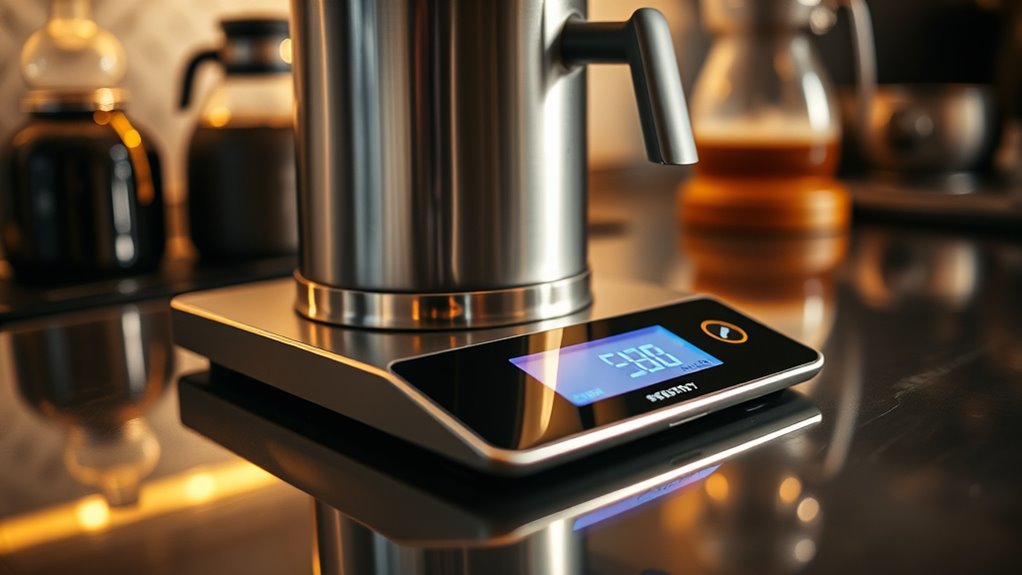
During brewing sessions, you need consistent measurements to guarantee your results stay reliable. Brewing variables like temperature and flow rate can affect accuracy, making precise scales even more critical. Understanding how these factors influence your scale’s performance helps you maintain quality every time. Additionally, forsale 100 scales are available that offer a balance between affordability and precision, making them suitable for various brewing setups.
Consistency in Measurements
Have you ever wondered how consistent your brewing measurements truly are in practice? The key lies in scale sensitivity and measurement reliability. When using integrated scales, small fluctuations can impact your results, especially if the scale isn’t sensitive enough to detect minor differences. To guarantee consistency, consider these factors:
- Regular calibration checks to maintain measurement accuracy
- Avoiding vibrations or drafts that can skew readings
- Using scales with appropriate sensitivity for your brewing process
- Recording measurements consistently to spot discrepancies
- Selecting scales designed for precision measurement to ensure reliable results during brewing sessions
Impact of Brewing Variables
Brewing variables such as temperature fluctuations, ingredient inconsistencies, and timing can considerably influence the accuracy of your measurements in real-world sessions. For instance, grain selection affects how much weight you add, but moisture content and grind size can cause variations, impacting scale readings. Similarly, maintaining proper fermentation temperature is critical; fluctuations can alter how ingredients behave, leading to inaccurate measurements of wort or fermenter weight. These variables can cause your integrated scale to register slightly off, especially if environmental factors aren’t controlled. To improve accuracy, track these brewing variables closely, calibrate your scale regularly, and account for ingredient and process inconsistencies. Recognizing how external factors influence measurement precision will help you make more reliable adjustments during brewing. Environmental factors such as humidity and ambient temperature can also impact scale performance and measurement accuracy.
Pros and Cons of Using Integrated Scales for Home Brewing
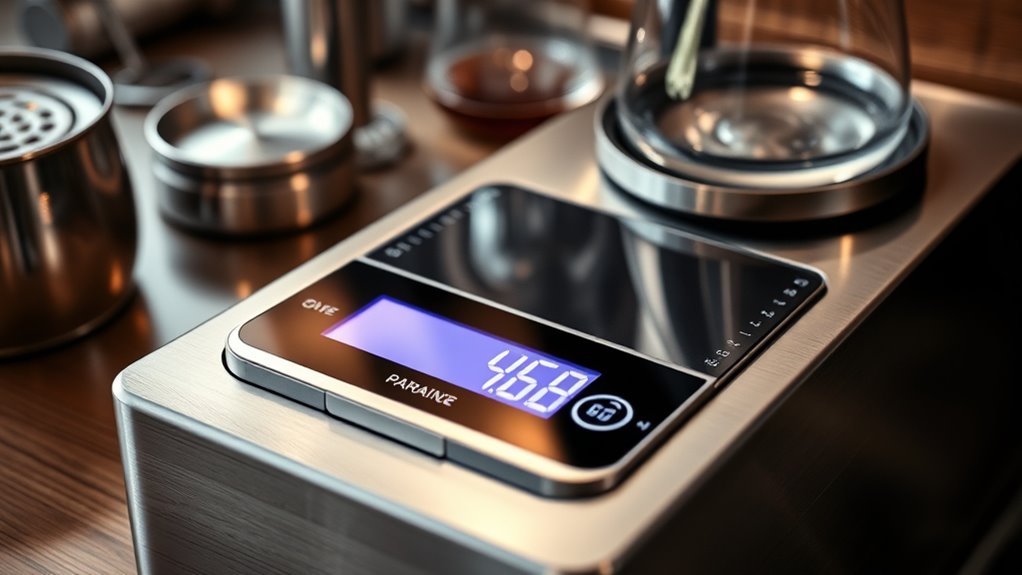
Integrated scales in brewer bases offer several advantages, making your home brewing process more precise and efficient. They enhance user convenience by allowing you to measure ingredients directly on the device, reducing transfers and spillages. Additionally, these scales can be cost-effective by eliminating the need for separate measuring tools and streamlining your workflow. However, there are some drawbacks. For example, integrated scales may lack the high accuracy of standalone scales, especially for small measurements. They can also be prone to calibration issues over time. Moreover, if the scale fails, it could disrupt your entire brewing process. In conclusion, these scales might add to the initial cost of your brewer base, which could be a concern if you’re on a budget. Overall, weigh these factors before choosing integrated scales for your setup. Accurate measurements are essential for consistent beer quality.
Professional Perspectives on Scale Reliability in Brewer Bases
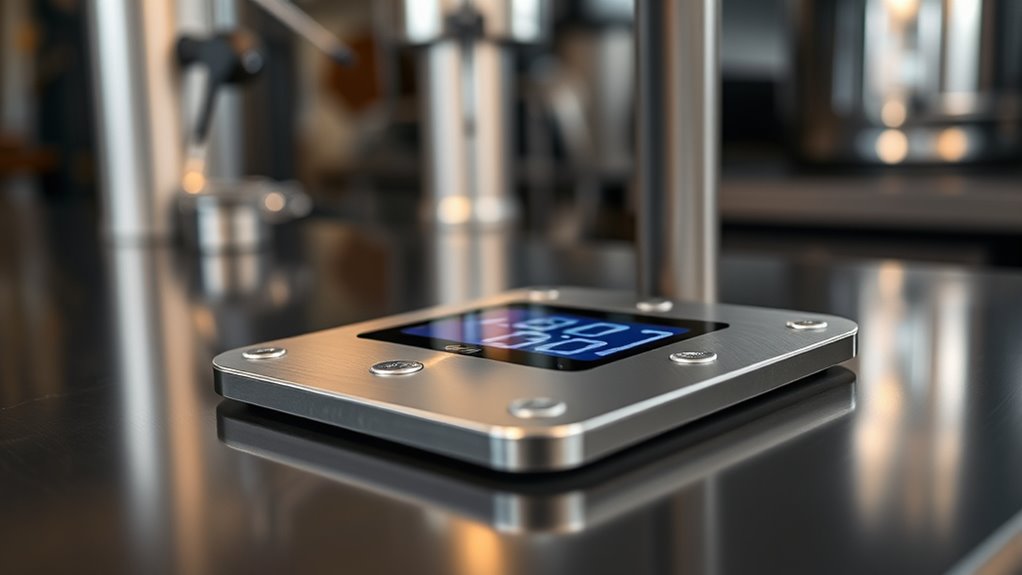
Experts generally agree that the reliability of scales integrated into brewer bases varies considerably depending on the quality of the device. High-quality scales tend to offer better scale precision, which is vital for accurate measurement. However, even the best scales require regular user calibration to maintain accuracy. Professionals emphasize that inconsistent calibration or poor build quality can lead to unreliable results, affecting your brewing consistency. Some recommend investing in models with proven precision and easy calibration features. The table below highlights common concerns from industry experts:
| Issue | Impact |
|---|---|
| Low scale precision | Inaccurate measurements, inconsistent results |
| Poor calibration options | Difficult to maintain accuracy |
| Build quality | Shorter lifespan, unreliable readings |
| Sensor sensitivity | Affects responsiveness in measurement |
| User calibration frequency | Ensures ongoing reliability |
Tips for Ensuring Accurate Measurements With Your Brewer Scale
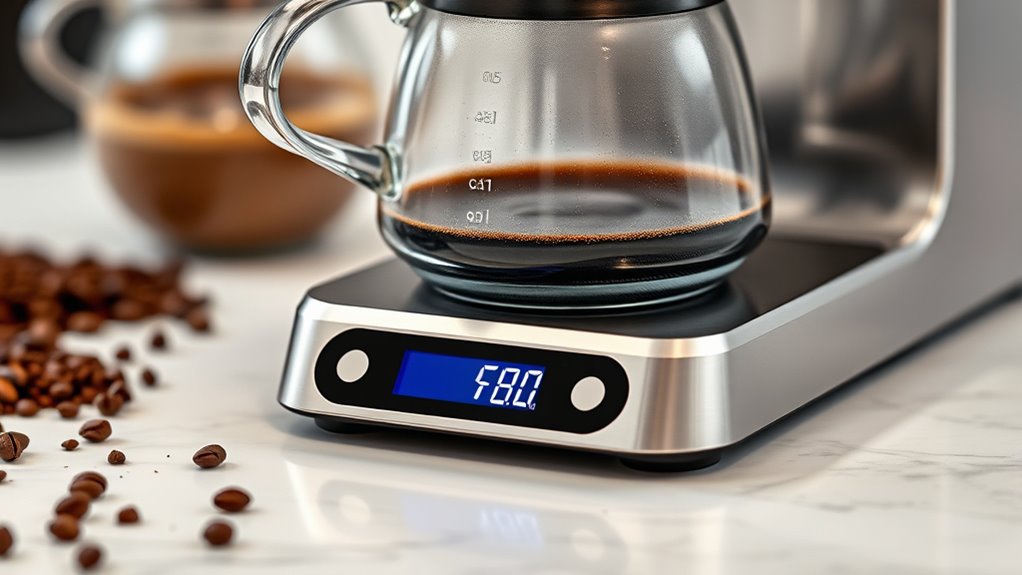
To guarantee your brewer scale provides accurate measurements, regular calibration is essential. Proper scale placement is key—place it on a stable, flat surface free of vibrations or drafts. Always check that your scale is set to the correct measurement units, whether grams or ounces, to avoid miscalculations. Accurate readings depend on consistent setup and environment. To improve accuracy, consider these tips:
- Ensure the scale is level and stable before use
- Use the same measurement units each time for consistency
- Avoid placing items on the scale that may cause uneven weight distribution
- Regularly calibrate your scale following the manufacturer’s instructions
Frequently Asked Questions
Can Integrated Scales Measure Ingredients Other Than Liquids Accurately?
Integrated scales can measure dry ingredients, but their non-liquid accuracy varies. You might find them useful for quick measurements, yet they often lack precision for detailed dry ingredient measurement. Factors like weight capacity and calibration affect accuracy, so for critical recipes, using dedicated scales is better. While integrated scales are convenient, they may not deliver consistent non-liquid accuracy needed for precise dry ingredient measurement.
How Does Temperature Affect the Accuracy of Brewer Base Scales?
Did you know that temperature fluctuation can affect scale accuracy by up to 2%? When using brewer base scales, you need to consider temperature changes, as they impact measurement precision. To maintain accuracy, make sure proper calibration frequency, especially in environments with significant temperature variations. Regular calibration compensates for temperature-induced errors, so your scale stays reliable and precise, helping you brew consistently perfect batches.
Are There Specific Brands Known for More Reliable Integrated Scales?
When choosing a brewer base with integrated scales, you should consider brand reputation and calibration methods. Reputable brands often use advanced calibration techniques, ensuring consistent accuracy over time. Look for reviews and user feedback to gauge reliability, and check if the brand offers easy calibration options. This way, you can trust that the scale will provide precise measurements, helping you maintain quality and consistency in your brewing process.
Do Integrated Scales Drain or Damage Over Time With Frequent Use?
You might wonder if integrated scales drain or damage over time with frequent use. While regular use can affect scale calibration, high-quality sensors are designed for durability, minimizing wear. Proper calibration and maintenance help guarantee accuracy and longevity. Keep an eye on sensor durability, and don’t forget to recalibrate regularly. This way, your brewer’s integrated scale remains reliable, even with frequent use.
What Is the Typical Lifespan of an Integrated Scale in a Brewer Base?
You might think your integrated scale is immortal, but it’s not. Typically, these scales last around five years with proper calibration and regular maintenance. Over time, wear and tear can affect accuracy, so don’t forget to calibrate regularly. If you neglect maintenance, you’ll be surprised how quickly your “forever” scale becomes a paperweight. Stay vigilant, and your scale will keep serving up precise measurements for years to come.
Conclusion
So, next time you trust your brewer’s built-in scale, remember it’s basically the superhero of your brewing world—kind of like a cape-wearing cat with a calculator. Sure, it’s handy, but don’t forget it’s not foolproof. If you want perfection, maybe keep that dedicated scale nearby. After all, in the quest for the perfect brew, even the most reliable scale should be treated like a quirky sidekick, not the hero.
